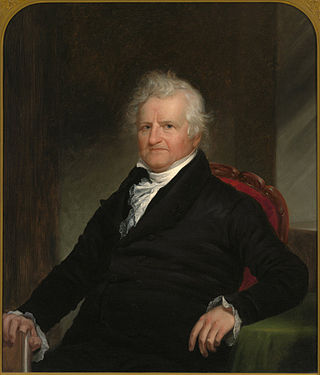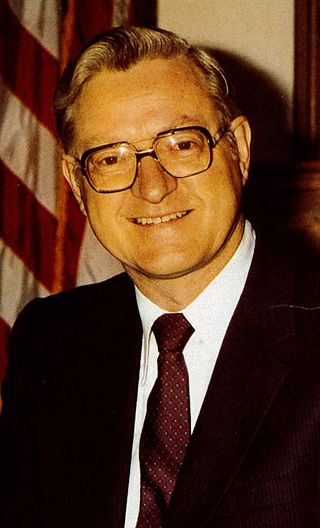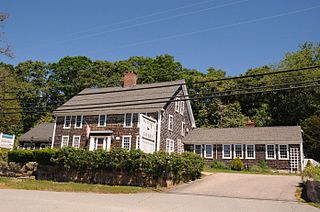Related Research Articles

Charlestown is a town in Washington County, Rhode Island, United States. The population was 7,997 at the 2020 census.

Joseph Bradley Varnum was an American politician from Massachusetts. He served as a U.S. representative and United States senator, and held leadership positions in both bodies. He was a member of the Democratic-Republican Party.

Elisha Reynolds Potter was a statesman in the Federalist Party from Kingston, Rhode Island, who served several times as the Speaker in the Rhode Island State Assembly.
Joseph Stanton Jr. was a military officer, a United States senator of the Anti-Federalist faction and a United States Representative of the Democratic-Republican party.
William West was an American militia general in the American Revolutionary War, Justice of the Rhode Island Supreme Court, Deputy Governor of Rhode Island, and anti-federalist leader. West also was a party in the first U.S. Supreme Court decision in 1791, West v. Barnes.

John Joseph Garrahy, known to Rhode Islanders as J. Joseph Garrahy or just "Joe", was an American politician. He served as the 69th Governor of Rhode Island from 1977 to 1985.

Nehemiah Rice Knight was Governor of Rhode Island and United States Senator from Rhode Island.
Nehemiah Knight was a United States representative from Rhode Island. He was born in Knightsville within the town of Cranston in the Colony of Rhode Island and Providence Plantations. He attended the common schools, engaged in agricultural pursuits, and was town clerk from 1773 to 1800. In 1783 and 1787 he was elected to the Rhode Island General Assembly, and was sheriff of Providence County in 1787.

The Joseph Stanton House is a historic house at 5153 Old Post Road in Charlestown, Rhode Island. The main house is a 2-½ story wood-frame structure built some time before 1739 by Joseph Stanton II, and it is where his son Joseph Stanton, Jr., who would serve as one of Rhode Island's first United States Senators, was born. The house belonged to Stanton, Jr. until 1811 when he sold it to Edward Wilcox, who began operating a tavern on the premises.
Since the Great Depression, Rhode Island politics have been dominated by the Rhode Island Democratic Party, and the state is considered part of the Democrats' "Blue Wall." Democrats have won all but four presidential elections since 1928, with the exceptions being 1952, 1956, 1972, and 1984. The Rhode Island Republican Party, although virtually non-existent in the Rhode Island General Assembly, has remained competitive in gubernatorial elections, having won one as recently as 2006. Until 2014, Democrats had not won a gubernatorial election in the state since 1992, and it was not until 2018 that they won one by double digits. The Rhode Island General Assembly has continuously been under Democratic control since 1959.
Wilcox House, or Wilcox Farm or Wilcox Farmhouse, may refer to:
Frances Latham (1610–1677), was a colonial American woman who settled in Rhode Island, and is known as "the Mother of Governors." Having been widowed twice, she had three husbands, and became the ancestor of at least ten governors and three deputy/lieutenant governors, and is related by marriage to an additional six governors and one deputy governor.

The 1819 Rhode Island gubernatorial election was an uncontested election held on April 21, 1819 to elect the Governor of Rhode Island. Nehemiah Rice Knight, the incumbent governor and Democratic-Republican nominee, was the only candidate and so won with 100% of the vote.

The 1818 Rhode Island gubernatorial election was an election held on April 15, 1818 to elect the Governor of Rhode Island. Nehemiah Rice Knight, the incumbent governor and Democratic-Republican nominee, beat Elisha Reynolds Potter, the Federalist candidate with 53.60% of the vote.

The 1820 Rhode Island gubernatorial election was an uncontested election held on April 19, 1820 to elect the Governor of Rhode Island. Nehemiah Rice Knight, the incumbent governor and Democratic-Republican nominee, was the only candidate and so won with 100% of the vote.

The 1834 Rhode Island gubernatorial election was held on April 16, 1834.

The 1835 Rhode Island gubernatorial election was held on April 15, 1835.

The 1817 Rhode Island gubernatorial election was held on April 16, 1817.

The 1816 Rhode Island gubernatorial election was held on April 17, 1816.
References
- ↑ Manual – the State of Rhode Island and Providence Plantations. Secretary of State, Rhode Island. 1878. p. 97.
- ↑ Kallenbach, Joseph Ernest (1977). American State Governors, 1776–1976. Oceana Publications. p. 507. ISBN 978-0-379-00665-0 . Retrieved June 15, 2023.
- ↑ https://preservation.ri.gov/sites/g/files/xkgbur406/files/pdfs_zips_downloads/national_pdfs/charlestown/char_post-road_stanton-house-and-monument.pdf National Register of Historic Places nomination form for Stanton House/Wilcox Tavern
- ↑ https://www.loc.gov/resource/rbpe.05101000/ "Defence of Governour Willcox", April 5, 1817. This hostile broadside accuses Wilcox of (among other things) visiting others so that he can invite them back to his house - a tavern.
- ↑ https://www.ricurrency.com/2012/12/30/phenix-bank-1-2/ Phenix Bank banknote with Wilcox's signature
- ↑ https://westerlylandtrust.org/wp-content/uploads/2019/08/Sunnyacres-Preserve.pdf "A History of Sunnyacres Preserve", Westerly Land Trust, 2018, p. 3-4